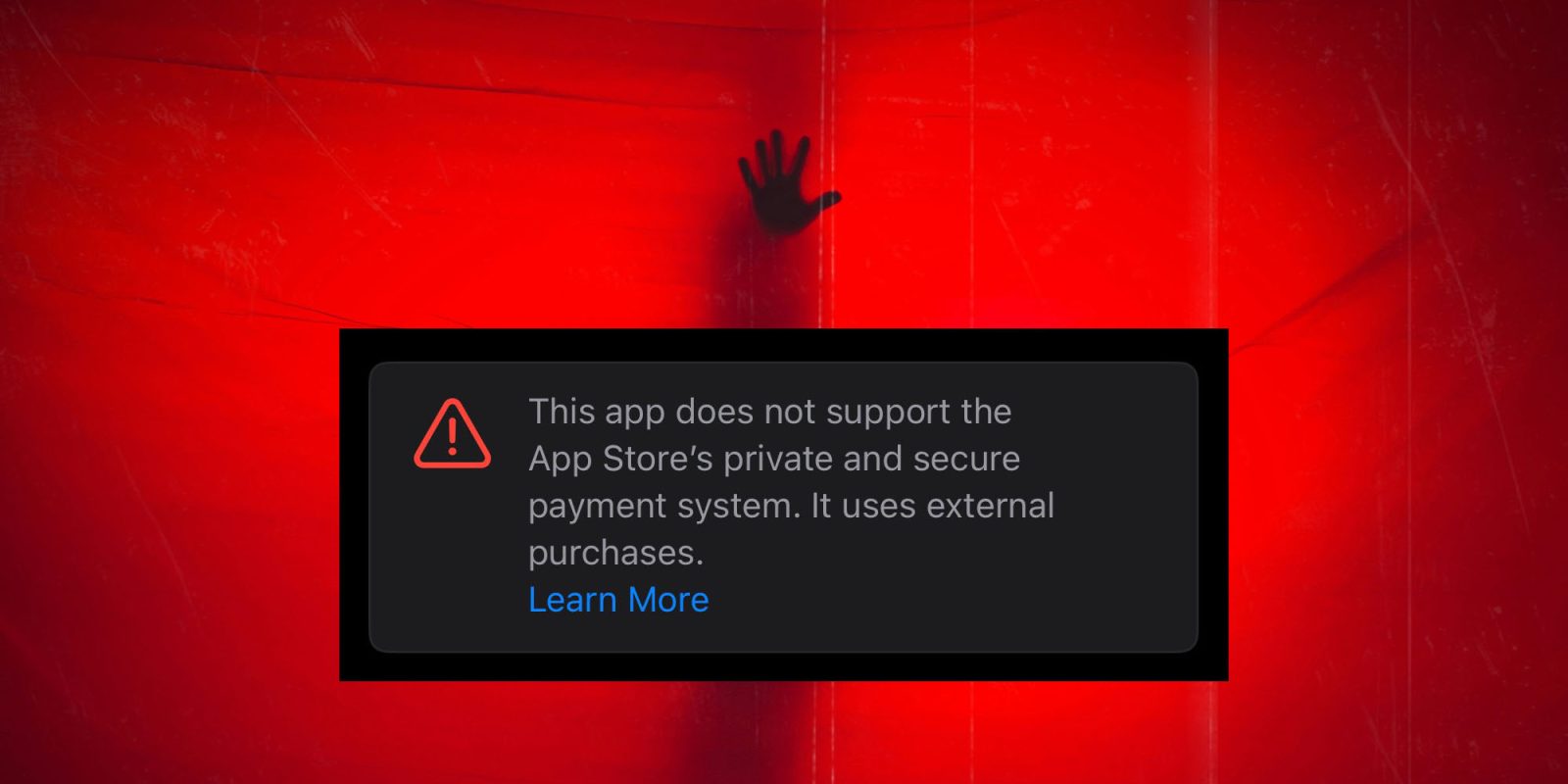
Update:
This message has been live in the App Store since the beginning of Apple’s DMA compliance efforts in March 2024.
In August 2024, Apple announced multiple changes to its compliance plan – including a change to the disclosure message that appears in the App Store for apps that do not use Apple’s In-App Purchase system. Apple proposed updating the disclosure to read:
Transactions in this app are supported by the developer and not Apple.
Learn more
The proposal also changed the design of the disclosure message, replacing the bright red “!” icon with a less aggressive gray “i” icon, as you can see below.
Apple tells 9to5Mac it was ready to implement the changes and that the EU took no issue with the updated disclosure sheet. According to Apple, however, the EU requested the company not implement the changes at that time and never followed up with further guidance. It then fined Apple $500 million for noncompliance last month.
Apple’s comments today align with a report from Politico last week, which said Apple tried addressing the EU’s concerns last summer but was stonewalled.
Here’s the updated disclosure sheet proposed by Apple:

Original story below.
After the EU required Apple to allow iPhone developers to bypass the App Store’s payment system, the company has now resorted to scare tactics to fight back.
Apple has added a prominent warning on these apps. This appears to violate the company’s own app guidelines, as well as likely breaking EU antitrust law …
Developer Viktor Maric tweeted a screengrab, using the example of one of the most popular business apps in Hungary, Instacar.
First time seeing this. Apple will punish the apps with external payment system.
Mac developer Michael Tsai notes that Apple supports three levels of alert messages in apps, and has specific guidance about when to use each.
- Informational (app icon): “to be used to inform the user about a current or impending event”
- Warning (app icon): “to be used to warn the user about a current or impending event[…] when the alert’s content is more severe than [informational]”
- Critical (orange ! triangle icon): “Use a caution symbol sparingly. Using a caution symbol like
exclamationmark.triangletoo frequently in your alerts diminishes its significance. Use the symbol only when extra attention is really needed, as when confirming an action that might result in unexpected loss of data.”
Apple is using the critical alert, which the company says is only for the most serious of situations, like being at risk of data loss. It’s hard to see how using a perfectly safe third-party payment processor like Stripe or PayPal would qualify.
The move also appears to violate the Digital Markets Act, the legislation that required Apple to permit third-party payment options in the first place. The DMA does not allow the use scare screens to dissuade people from using external payment options, as this would qualify as an illegal anti-steering measure.
Top comment by Indeed
Not trying to defend Apple here, bc they are throwing SO much shade at the other apps and the EU, but even tho Stripe and PayPal (and many others) are secure payment systems, there is the possibility that an app could use another method that is NOT secure. There is nothing in place to force apps to use the other very good options for payment. So while not technically wrong, they are really stretching.
John Gruber called out Apple for spreading FUD, though ascribes it to ignorance rather than malice.
The uncompetitive nature of the App Store — I’m using uncompetitive rather than anticompetitive just to give Apple the benefit of the doubt here — has left at least some top Apple executives hopelessly naive about the state of online payments […]
Apple’s IAP system has numerous advantages and user-centric features [but] the fact that it’s “private and secure” is no longer distinguishing at all.
9to5Mac’s Take
I won’t repeat remarks I’ve made countless times before about the stupidity of getting embroiled in pointless and endless wars with regulators.
If Apple simply highlighted the key benefits of buying through the App Store – being able to manage all your purchases and subscriptions in one place, and Apple having your back in the case of disputes – most people would freely choose to use it. Compete, don’t try to stop competition.
Highlighted accessories
- Anker 511 Nano Pro ultra-compact iPhone charger
- Spigen MagFit case for iPhone 16e – adds MagSafe support
- Apple MagSafe Charger with 25w power for iPhone 16 models
- Apple 30W charger for above
- Anker 240W braided USB-C to USB-C cable
Image: 9to5Mac composite of Maric’s tweet and photo by Tommy Pascale on Unsplash
FTC: We use income earning auto affiliate links. More.



Comments